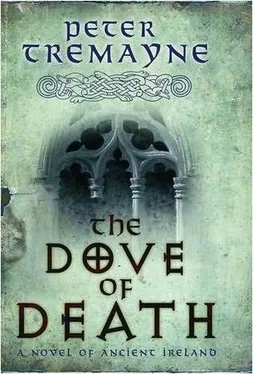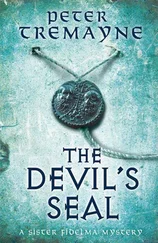Peter Tremayne - The Dove of Death
Здесь есть возможность читать онлайн «Peter Tremayne - The Dove of Death» весь текст электронной книги совершенно бесплатно (целиком полную версию без сокращений). В некоторых случаях можно слушать аудио, скачать через торрент в формате fb2 и присутствует краткое содержание. Жанр: Исторический детектив, на английском языке. Описание произведения, (предисловие) а так же отзывы посетителей доступны на портале библиотеки ЛибКат.
- Название:The Dove of Death
- Автор:
- Жанр:
- Год:неизвестен
- ISBN:нет данных
- Рейтинг книги:5 / 5. Голосов: 1
-
Избранное:Добавить в избранное
- Отзывы:
-
Ваша оценка:
- 100
- 1
- 2
- 3
- 4
- 5
The Dove of Death: краткое содержание, описание и аннотация
Предлагаем к чтению аннотацию, описание, краткое содержание или предисловие (зависит от того, что написал сам автор книги «The Dove of Death»). Если вы не нашли необходимую информацию о книге — напишите в комментариях, мы постараемся отыскать её.
The Dove of Death — читать онлайн бесплатно полную книгу (весь текст) целиком
Ниже представлен текст книги, разбитый по страницам. Система сохранения места последней прочитанной страницы, позволяет с удобством читать онлайн бесплатно книгу «The Dove of Death», без необходимости каждый раз заново искать на чём Вы остановились. Поставьте закладку, и сможете в любой момент перейти на страницу, на которой закончили чтение.
Интервал:
Закладка:
‘What happened to the others? Were they murdered by their successors?’ There was almost a sneer in Brother Metellus’ voice. ‘That was usually how it happened among our emperors. That is why I believe in the old res publica system.’
‘Death overtook them. The Yellow Plague caused much death in our lands.’
Brother Metellus was not convinced, scoffing, ‘And you claim that even a woman could succeed to be head of the family in your land?’
‘It is so.’
‘It would not be allowed in Rome.’
‘So I learned,’ agreed Fidelma. ‘In your republic, a man had complete control over his wife and family, like property. A woman could not conduct business but a man had to be guardian over her, although married women did not have to live in seclusion and could take meals with their families inside their houses.’
‘And your ways are better?’ challenged the Brother.
‘Our ways are different,’ conceded Fidelma, ‘but, on balance, I would argue that life for our people is, in many ways, better. But each society has to develop according to their beliefs and conscience. My argument with Rome is that what is good for Rome is not good for the rest of the world, whether imposed by the military legions that dominate the world or by the Church in Rome that tries to tell people how to behave even in lands far distant, with different customs and ways of looking at the world.’
The monk frowned ominously. ‘That sounds like heresy, Fidelma of Cashel.’
Eadulf grew suddenly nervous at his tone.
‘The churches of Éireann and of the Britons have different ways of looking at things, Brother. You must know that,’ he intervened, trying to mollify the Roman. ‘It does not mean to say that they hold beliefs that are opposed to the orthodox doctrines of the Faith, or beliefs which have been specifically denounced by the Church.’
‘Our Lord told Peter that he would be the one to found the Church. Peter came to Rome and was martyred there. So the Christian Church was founded in Rome. Rome is the centre of the Church and must be obeyed,’ replied Brother Metellus stubbornly.
‘That is not the way the churches of the east see things,’ observed Fidelma quietly. ‘Nor how the churches of the western islands see things. The Bishop of Rome is regarded as having a primacy of honour among the bishops of the faith, but not a primacy of power.’
Brother Metellus reddened in annoyance.
Eadulf glanced quickly at Fidelma and tried to indicate a warning. He knew that she loved discussion, intellectual argument, but if Brother Metellus was taking this as an insult to his beliefs, then Eadulf envisaged that they might be stuck on this island for a long while. However, Fidelma was oblivious to his attempt to calm matters. She was merely pleased to concentrate her mind away from the events of the last day.
‘What I mean is that the Church of Constantinopolis claims the same apostolic succession, celebrates the same sacrament and follows almost the same theology. Its own Chief Bishop is called the Patriarch whose title is from the Greek pater-archon — the “father leader”. That is almost the same title as given to the Bishop of Rome. He takes the name from the Greek pápas , or father, as well. Other places like Alexandria also have their Patriarchs who do not consider themselves under obligation to obey Rome. They believe in their independence. Are all the eastern churches in heresy?’
Brother Metellus thrust out his jaw pugnaciously. ‘During the last hundred years, the Bishops of Rome excommunicated the patriarchs of Constantinopolis from the Faith,’ he ground out. ‘Indeed, they have excommunicated the patriarchs of Alexandria and Jerusalem.’
‘And doubtless the patriarchs have done the same to the Bishop of Rome,’ countered Fidelma in good humour. ‘What does that mean? It shows they are all, sadly, too human. Instead of sitting down to debate their differences and come to a resolution, they resort to rituals of the supernatural as a means of exerting their will.’
Brother Metellus stared at her in disbelief for a moment and then, to the surprise of both of them, he burst out laughing.
‘I swear that I have not had a good discourse with a woman on the Faith in many years,’ he finally said, wiping his eyes. ‘You are truly learned, Fidelma of Cashel. I am glad I decided to fish you out of the sea…both of you, that is. I don’t agree with you, but I enjoy discussion. May we have many more arguments.’
‘Rather exchanges of ideas,’ corrected Fidelma solemnly, ‘for without exchanging ideas, how can there be any learning or progression?’
Brother Metellus glanced at the cloudy sky outside.
‘It will soon be time for the evening meal,’ he said. ‘Then we’ll see how the weather shapes for tomorrow. In the meantime, there are services to perform in my poor chapel. I would invite you to join me, unless your rituals would prevent you?’
Fidelma gave a small mischievous smile. ‘There is little difference in intent, and while we prefer to conduct our services in the language of the sacred texts — which is Greek — when we were in Rome, I observed little for me to object to.’
‘Then you are welcome to participate in the service with me.’
By evening, the wind was beginning to die away and the sea was changing colour once again, losing its white billows and becoming calmer.
When they gathered for the meal later, Brother Metellus greeted them with a warm smile as if the intensity of their discussion that afternoon had not existed.
‘I think we will be able to set sail in the morning,’ he said with satisfaction. ‘We’ll leave at first light as we originally intended to do this morning.’
This time the weather grew tranquil during the night.
The day dawned calm and warm, with the sun beating down from an almost cloudless sky. The few clouds that did drift high above were fluffy white balls, like the fruiting puffs of groundsel. What was more, there was a soft morning breeze blowing from the south.
With the single sail hoisted, it quickly filled and the small boat, with Brother Metellus at the tiller, was gliding swiftly out from the bay, leaving a small knot of islanders waving their goodbyes on the foreshore. The journey across the water to the mainland seemed swift, and so calm was the sea that even Eadulf did not have time to feel queasy. Brother Metellus was an excellent sailor, manoeuvring his sailing boat with consummate skill, shifting every time there was a subtle change in the wind to re-catch the force of it in his sail. Fidelma observed that the monk knew the waters well, for there was a series of rocky shoals through which he navigated with ease. They did not speak much during the short voyage over the distance that separated the island of the Little Duck from the low-lying stretch of land that Brother Metellus identified as the Rhuis peninsula.
Fidelma was aware of the sheer numbers of seabirds as they approached the coastline. The ringed plover, with their distinctive black ring and bright orange bill and legs, were heading along the shoreline in search of shellfish in the mudflats. High up, marked by their white crowns and underparts, but dark brown upper feathers, two osprey wheeled, alternatively flapping and gliding, as they hunted for fish swimming near the surface. A sudden pause, as if they were hovering, and then with partly closed wings, the birds dived on their kill. Fidelma had seen osprey before, but it was always a spectacular sight, watching them make their kill. Even the gulls, emitting cries like souls in torment, seemed to avoid these hunters.
‘The abbey is around that headland,’ called Brother Metellus, pointing to a rocky headland with a large green mound. The area was covered with thickly growing woodland. There seemed no place to effect a landing.
Читать дальшеИнтервал:
Закладка:
Похожие книги на «The Dove of Death»
Представляем Вашему вниманию похожие книги на «The Dove of Death» списком для выбора. Мы отобрали схожую по названию и смыслу литературу в надежде предоставить читателям больше вариантов отыскать новые, интересные, ещё непрочитанные произведения.
Обсуждение, отзывы о книге «The Dove of Death» и просто собственные мнения читателей. Оставьте ваши комментарии, напишите, что Вы думаете о произведении, его смысле или главных героях. Укажите что конкретно понравилось, а что нет, и почему Вы так считаете.











